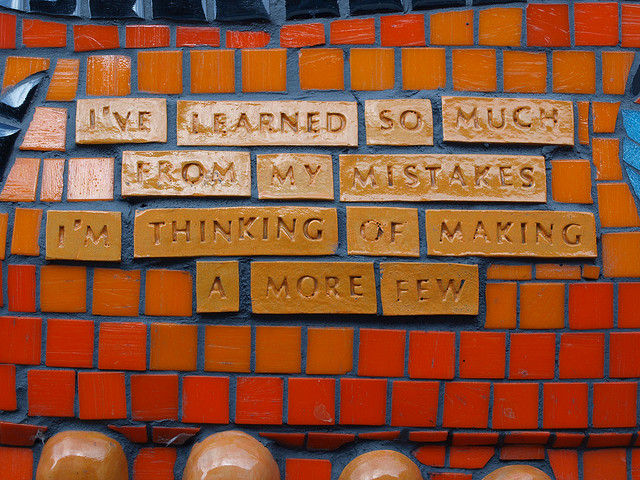If you have a child in youth sports, then you know that kids make mistakes and often struggle to recover from them. The following excerpt from Football Momʼs Survival Guide may be speaking to moms of football players, but the truths are for every parent of a young athlete who knows the frustration and humiliation of making errors in his game.
| This is a guest post by Janis Meredith. Janis is a sports mom and coachʼs wife. She writes a sports parenting blog called JBM Thinks. Get her latest ebook “Football Momʼs Survival Guide” just released in July. If you want to guest post on my blog, check out the guidelines here. |
Everyone makes mistakes, but an athlete’s errors get more publicity. Not only are their mistakes seen by teammates and spectators, they are often broadcast in the local news. I want to cringe when I see young athletes get press for their errors, but unfortunately it’s all part of the game.
The proper way to handle mistakes
If your goal is to teach your son to learn from his mistakes, the first step is for you, Mom, to maintain your composure. Your son will learn through observation how to deal with adversity. Vent, if you have to, but not to your kids. Find one person who can be a steady sounding board. Then forget about it. Donʼt dwell on your sonʼs mistakes.
No one benefits from “what-ifs”; they will only frustrate you.
Maintaining your composure also means you avoid sending the “shaming” messages we often send our kids: How could you have done that? You don’t listen to me! You can do better than that! What’s the matter with you? Those messages damage our sons and make them feel unworthy.
Your son also needs to know that he is not the only one who makes mistakes. It may help your son to know about a mistake you made when you were younger or even recently. That will help him see that it is possible to move on and recover. And when we admit mistakes, it is important to pinpoint what we would do differently the next time.
Mistakes come before success
As you share your mistakes, remind him that famous people have suffered setbacks too, but we often only see the end result, not the frustrations they experienced leading up to that result.
For instance, Abraham Lincoln was defeated for public office eight times before being elected president of the United States. The Wright Brothers made seventy attempts to get the Wright Flyer off the ground at KItty Hawk. Louisa May Alcott was told by countless publishers that no one would ever read Little Women. In the year that Babe Ruth hit the most home runs, he also had the most strikeouts.
Learning from mistakes leads to solutions
Facing mistakes is the first part of recovery from mistakes; the second part is to look for solutions. When our son sang the “I suck” tune, we reminded him that even great quarterbacks make mistakes, and errors do not make them a bad athlete. Even after Peyton Manning threw five interceptions in a game, he came back confident and strong the next week, ready to face a new game and move past his mistakes.
Great athletes are ones who learn from their mistakes. And when your son can label the mistake as the error, not himself, the next step is to find a solution. What can he do differently? What practice drills will help him prevent that error from happening again?
How does self-esteem impact handling mistakes?
Perhaps the best tool your son can use to help him deal with his errors is high self-esteem. Dr. Michele Borba, an educational consultant and author, states that children with high self-esteem appear much better at coping with their errors.
“Watching children with positive self-perceptions deal with an error is always a magnificent sight,” Borba says. “These children literally stand up, brush off their knees, and say, ‘Well, I blew it. What should I do differently next time?’ They recognize that a mistake was made and admit the error. Most importantly, these children also develop a strategy to change the mistake and not do the same thing again. What they do, in reality, is learn from their errors.”
On the other hand, children with low self-esteem deal with mistakes differently. They devalue themselves: I told you I can’t do anything right! Instead of looking at the error as an opportunity to learn, they see the experience as a reason to quit.
Making deposits
Parents are major contributors to a child’s self-esteem. Our love, support, positive reinforcement, and unconditional acceptance will build up the bank so that mistakes do not empty it out. Your son will learn faster from his mistakes if he is in an environment that accepts mistakes and gives him the room to grow, learn, and succeed.
Question: How do you handle you or your kids making mistakes?

